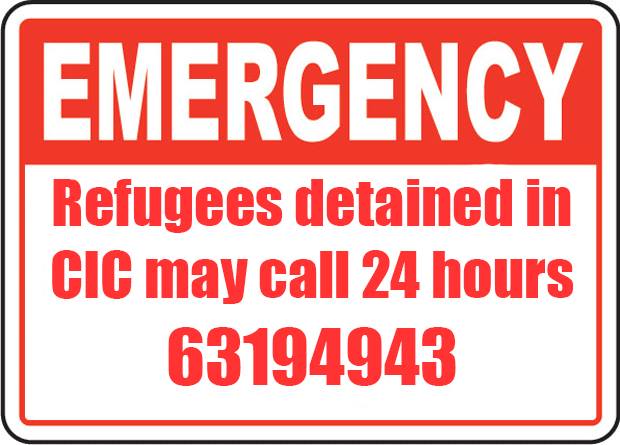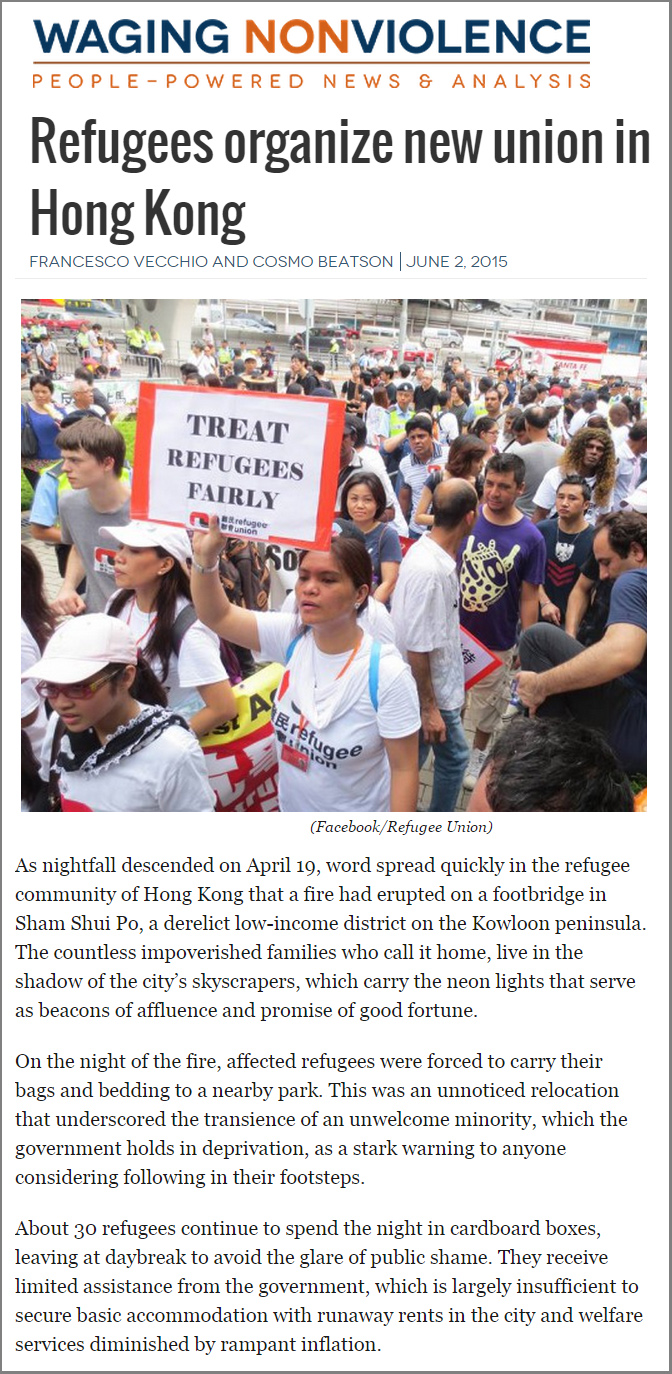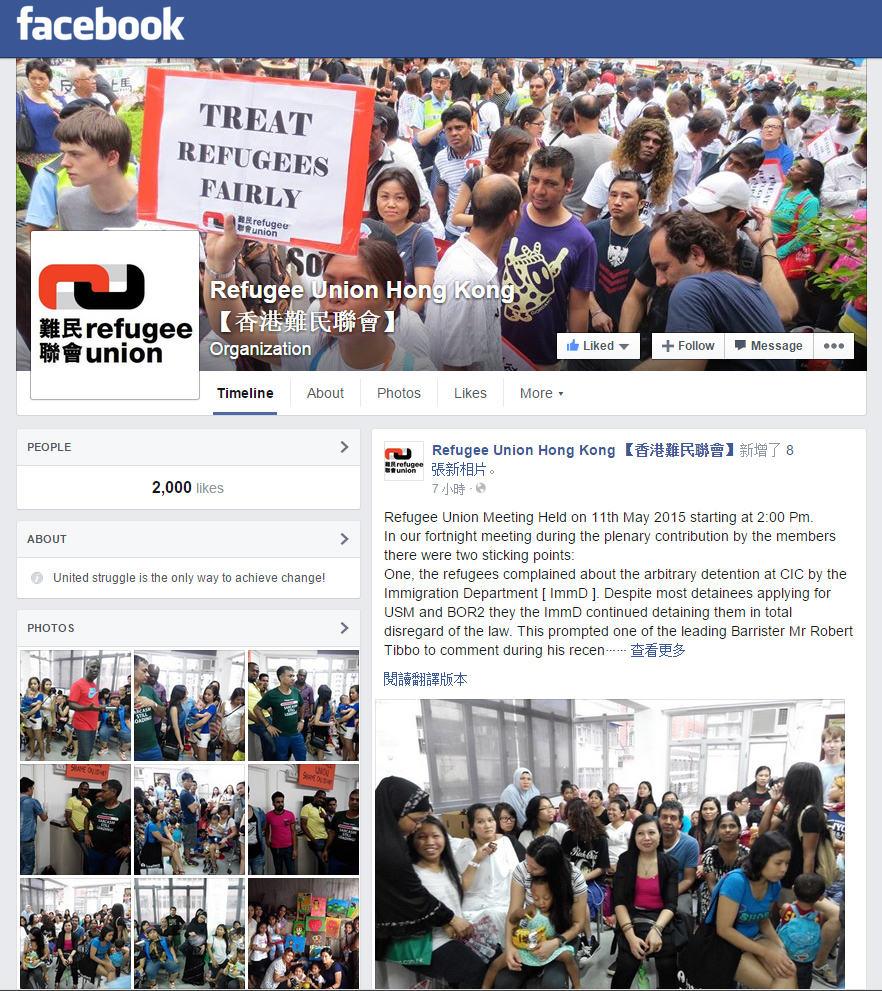Refugee Union brief lawmaker ahead of Legco welfare meeting
Jun 3rd, 2015 | Food, Government, Housing, Refugee Community, Welfare | Comment
How things have changed! Veteran refugee workers recall a time not so long ago when the SWD didn’t reply to emails about problems faced by their clients, because the task was delegated to its service contractor. By comparison today the Refugee Union communicates daily directly with the SWD head-office to report failures, lodge grievances and request assistance.
It is equally unprecedented that in April 2015 the Refugee Union approached the Legislative Council Redress System and filed 500 complaint letters drawing attention to their plight and campaigning for improvements. Vision First takes credit for paving the way that gives a voice to the voiceless and empowers refugees to stand up for themselves and demand the changes needed by their community.
Following a preliminary meeting on 22 April 2015, the Hon. Fernando Cheung Chiu-hung invited the Refugee Union to discuss welfare concerns ahead of the meeting of the Legislative Council’s Panel on Welfare Services on 8 June 2015. It is noteworthy that refugee welfare made the Panel’s agenda in under two months, compared to nine in 2013. Is it an indication that the wellbeing of refugees has gained in priority over the past two years? If so, what factors contributed to this?
Discussing the topic at hand, a Bangladeshi refugee told Fernando, “I have been in Hong Kong for 15 years and I am not allowed to work. Things are getting better. It seems the government is listening to our complaints and treating us like human beings. I lived in the slums for many years. They are closing down this year after a refugee died in a fire. It is true that for $1500 [in rent assistance] we cannot get a room anywhere. The government should increase the amount to $2000.”
An African colleague commented, “It is unreasonable that refugee without money or jobs are forced to sign agreements with landlords. Isn’t this cheating? We commit to deals we cannot keep because we cannot pay for the high rent. Is it entrapment? This policy makes us delinquent tenants when we don’t pay. ISS case-workers urge us to get money from NGOs and churches, who say they are also struggling to fundraise. Instead we suggest that our case-workers sign the tenancy agreements with the mandate of the government. All we want is a safe place to sleep.”
A refugee mother spoke about the food, “The coupons are better. There are some problems we need to resolve, but generally people are happy. However we need competition as Wellcome prices are not always cheaper. ParknShop and Kaibo supermarkets should be included. Why not give refugees an Octopus card accepted by these three supermarkets? Or Wellcome could match the lowest prices offered by competitors because already [the food allowance] is too little.”
A Pakistani added, “Yes, the coupons are good. I received $1200 also for my children and I hope it is the same for all families. It is impossible to live on $40 food so many refugees must work. The food allowance should be increased to $1500. Also, we don’t get dish soap or toilet paper [one roll a month] and razors [one a month] break in our hands. The SWD should save the money of toiletries, staff and storage to give us one more coupon to buy what we really use.” A woman then described sanitary pads considered of dreadful quality, unsafe and unhygienic.
The Hon. Fernando discussed these and other issues with the Refugee Union members, displaying genuine concern and a determination to push for improvements at the Legco Panel on Welfare Services on 8 June 2015. He noted that the 45 minutes allocated would only allow for the discussion of two topics, which were agreed to be rent and food – the greatest concerns of the community.
The previous increase in levels of assistance was introduced on 24 January 2014, when the monthly rent allowance was raised from $1,200 to $1,500, security deposits and estate agents’ fees were introduced and the food budget was increased from $1,060 to $1,200. Unlike the Comprehensive Social Security Assistance (CSSA) provided to needy residents, there is no mechanism to tie refugee assistance with inflation – an arrangement that ought to be considered by the Panel.
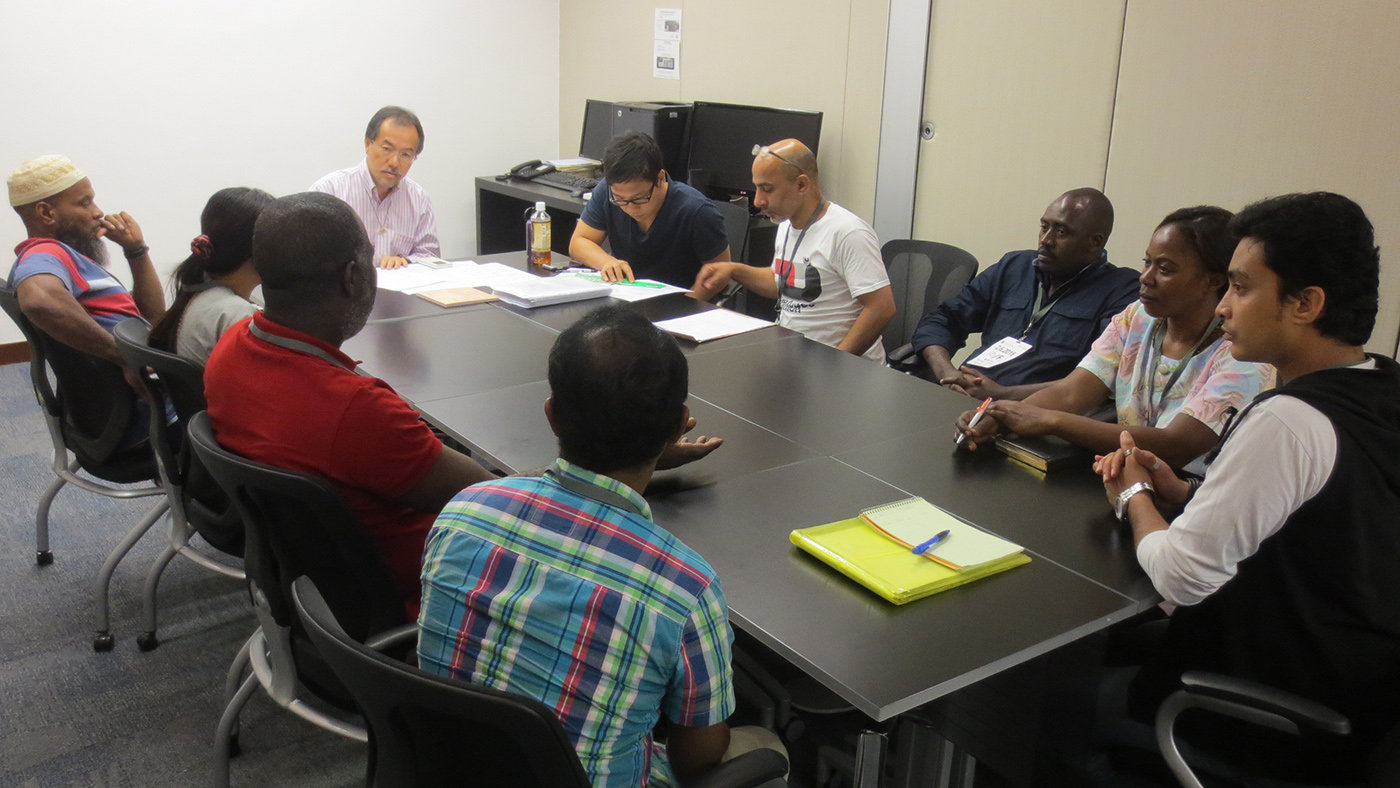
Refugees organize new union in Hong Kong
Jun 3rd, 2015 | Media, Refugee Community, VF Opinion | Comment
Refugee community welcomes food coupons with reservation
Jun 2nd, 2015 | Food, Refugee Community, Welfare | Comment
At 1pm on 28 May 2015 the first message about the food coupon distribution circulated on social media. A father of three informed, “Whoever will go to sign at ISS will receive 1200$ coupons, each coupon valued 100$…. But there are limited items to choose. Not all items [are available]. Toiletries will collect from ISS offices the day of signing.”
It was good news though a distressed refugee called Vision First later that evening after returning from his first experience at Wellcome. He said words to this effect, “I went to Wellcome, but there is no Halal food. I asked the staff and they say they don’t have it. Sir, what can I do?”
Long-time observers of the asylum sphere might agree that the policy shift from the staunchly supported in-kind food distribution to supermarket coupons is nothing less than remarkable. While the authorities are unlikely to publicize the underlying research and ensuing rationale for the reversal, the change might indicate government resolve to counter questionable practices.
From a broader prospective, Vision First has been informed that independent ethnic grocery shops in Kowloon are pleased with the development although profits from the new SWD tender (estimated at over 100 million HKD for food alone) will flow exclusively into the coffers of Dairy Farm, the owners of Wellcome supermarkets, listed on the London Stock Exchange and member of the Hong Kong conglomerate Jardine Matheson Group.
A shop owner explained, “The coupons will stop the trading of ISS supplies that halved the price of flour, sugar, oil and rice around the [ISS appointed grocery] shops. Other owners reported that the middlemen stopped re-selling [ISS food items]. They were buying it cheaply from refugees and selling it to shops, restaurants and residents. Also, a wholesaler said that business picked up because shops now buy from them after the cheap reselling stopped.”
Refugees have largely reacted positively, though some mothers complained they could not buy baby formula, despite others succeeding at different branches. A refugee posted, “One of my friends went to Waihong [Chinese name for Wellcome] and wanted to buy mill for her baby and the cashier said that she can’t buy the milk with the coupon. So what is the use of the coupon that we get from ISS if we can’t buy the milk for our babies?”
Another mother was told by her caseworker that baby formula was an accepted item, though others lamented that fresh milk was excluded. Although it represents a new disruption to refugee service that could have been reasonably prevented, it is understandable that a grace period may be required to resolve service variations. Another refugee reported, “Not all Wellcome shops are well-instructed. Out of 5 shops, only 2 are OK. One shop told me I can buy only rice and noodles, nothing else.”
On the other hand, a Refugee Union member posted, “Some people from Sham Shui Po called me today. They are very happy with [the food coupons] … Yesterday I talked with one Wellcome saleswomen. She said they are preparing all the kinds of food for us. They need a little more time. And as I know that electronic coupons are coming also. So let’s wait and see.” Could this refer to an Octopus-like card replenished by ISS-HK monthly that would allow less than 100$ purchases as change is not offered for the coupons?
Finally on a positive note, a lady posted a photo of the groceries she collected from Wellcome with the comment, “This is what I buy from Wellcome today and all is OK” Her message received an encouraging response from another refugee, “As for the adult foods, we are OK. We were able to get want we want and of good quality. WE ARE HAPPY. WE FEEL THAT WE ARE HUMAN WHO CAN ALSO PURCHASE IN SHOPS JUST LIKE ANYBODY ELSE. AND FOR THIS WE THANK VISION FIRST AND THE REFUGEE UNION.” (original emphasis)
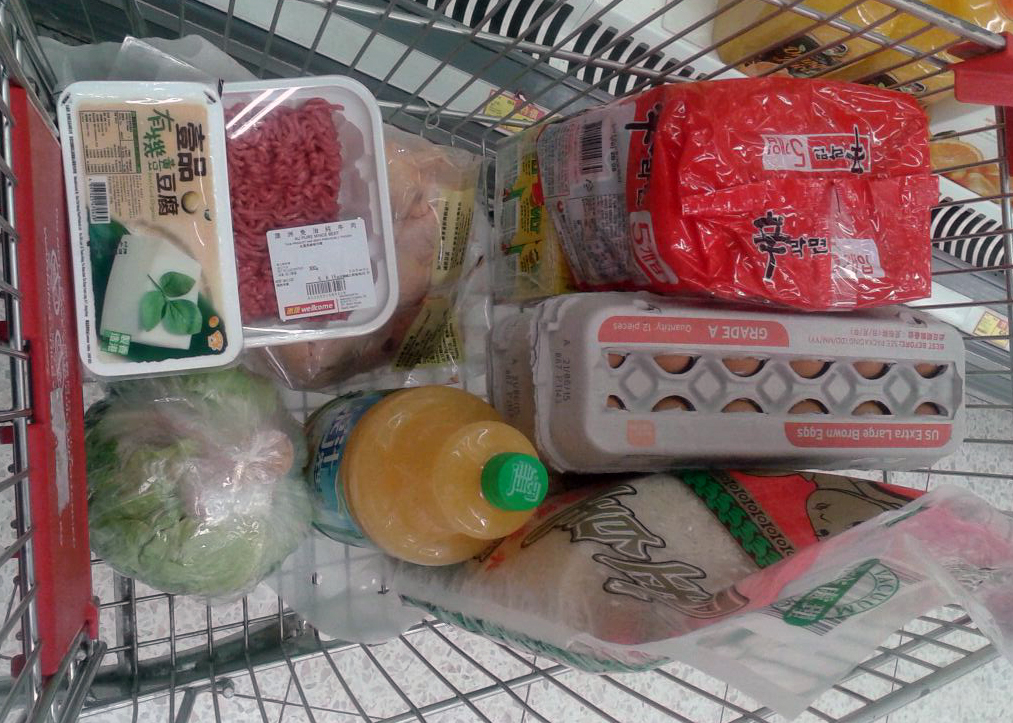
Supermarket coupons replace in-kind food distribution for refugees
May 29th, 2015 | Food, Refugee Community, Welfare | Comment
Remarkable events over the past year demonstrate that refugees can affect change when they work together. Consideration should be given to the events that led to the introduction of supermarket coupons to replace the in-kind food distribution that has been the preferred arrangement since humanitarian assistance for refugees was introduced in 2006.
“We request the immediate introduction of itemized price to ISS food collection forms … it is vitally important that we … are informed and allowed to make informed decisions on what is available, at what price and in what quantity.”
On that morning refugees staged a sit-in at three branches of ISS-HK to protest against practices alleged to reduce the value of rations and cause widespread hardship to refugees who rely on government assistance and face 15 to 22 months incarceration if arrested working.
The Media investigated the food distribution system established for refugees which was claimed to compromise food security rights for the asylum population.
On 19 February 2014, the South China Morning Post reported that:
“Post’s research supports claims that food supplied by government contractor is worth much less than its stated value … A comparison found that buying the goods on the lists would cost between 13 and 30 per cent less than the HK$ 1,060 worth of food ISS was contracted to provide … The amount for groceries increased to HK$ 1,200 this month after government nutritionists deemed an increase necessary.”
On 20 February 2014, Metro Daily published its investiation:
“Refugees were left hungry like dogs … The government has increased the amount of assistance to be provided to refugees … investigations have found that the food they are receiving from ISS is less than the amount set by the government by at least 25% … That adds up to just $900 per month and this is less than the official aid amount by $300.” (Translation)
On 9 March 2015, Cable TV reported the results of its investigation:
“The food rations refugee collect every month have ‘shrunken’. We investigated how much the reduction is and where the missing money goes … Our reporter took his food packages to compare prices at the market. The total price of his monthly food was $993.30 or $200 less than his $1200 food allowance. Also the weight of the food Hassan collected is less than what he selected in the forms … Our reporter also found that other refugees receive ‘shrunken’ food collection … about 20% less.” (Translation)
In March 2014 the refugee community was disappointed by the initial reaction of the Social Welfare Department that dismissed many documented complaints:
“The SWD has conducted in-depth investigations into over 20 complaints made by service users about the undesirable quality and quantity of the food they received. Investigation results showed that the complaints were not substantiated. The SWD will continue to take each and every complaint seriously.”
Nonetheless, the Refugee Union directed numerous complaints to the SWD head-office on a regular basis and established trust with senior welfare officers who became increasingly sympathetic with the problems brought to light. While powerless to increase the actual levels of assistance, the SWD considered implementing remedial actions.
Cautious optimism spread in December 2014 when the SWD issued a new servive tender requesting that:
“The Contractor shall provide each Service User with food of different varieties … in the form of food coupons that should be non-transferable and non-cashable.” While concerns were raised about the actual implementation of the scheme – for example, would the current shops be involved – the shift away from emergency rations was welcomed.
Finally on 28 May 2015, the Refugee Union’s relentless campaign scored a historic victory with the introduction of food coupons from “Wellcome”, self-described as the largest and longest established supermarket chain in Hong Kong with 280 stores serving more than 16 million customers every month.
Initial reactions are positive. Yet it is reported that the Refugee Union will monitor the implementation of the system, one member noting possible shortcomings:
“There is another issue about food items which we South East Asians eat, like atta, dall, basmati rice. Will these be available at (Wellcome)? And one thing more during I was at ISS office I heard a (refugee) was arguing with officer about halal meat problem. So I asked my officer why ISS did not get refugee representatives’ advice before the take any decision?”
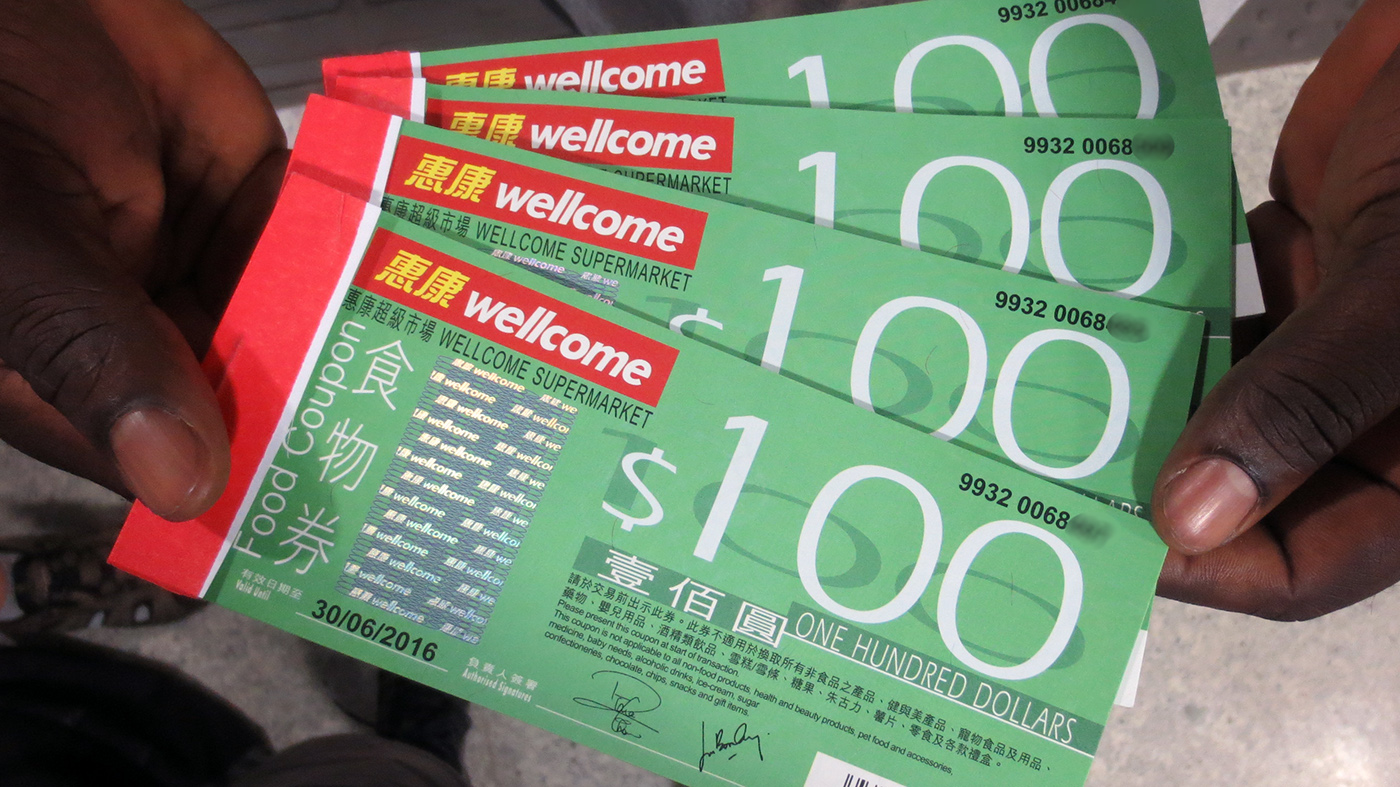
Legal team successfully counters Immigration’s hasty removal action
May 24th, 2015 | Immigration, Legal, Refugee Community, Rejection, VF Opinion | Comment
There wasn’t an empty seat in the courtroom as members of the Refugee Union attended the emergency proceedings to stop the hasty removal of a hapless South Asian refugee by the Director of Immigration. Flanked by two stern-looking Immigration officers in blue uniforms, a bewildered Mr. Q stooped apprehensively in a High Court defendant box. A dark oversize jacket draped the worries of a man who would have been deported three days earlier were it not for the timely intervention of a pro bono legal team.
It is likely that Mr. Q was profiled as undesirable by Immigration officers when he arrived at Hong Kong International Airport on 23 December 2014. He was refused permission to land and taken into custody. He subsequently lodged an asylum claim and was detained at CIC under Section 37ZK of the Immigration Ordinance that prescribing, “A claimant may be detained … pending final determination of the claimant’s torture claim.” The issue is: How long can a refugee be lawfully detained?
Trouble erupted in Mr. Q’s life after he participated in district elections in his country of origin and was assaulted and threatened that, “All your family will be wiped out if you don’t change political party.” As the 45 year-old family man was unwilling to fight back, the forsaken road of asylum beckoned and he fled to Hong Kong. On 9 March 2015 Immigration rejected his asylum claim at first instance and a troubled Mr. Q sought the assistance of the Refugee Union.
“He has a strong case and is afraid of being deported”, explains Arif of the Refugee Union, “He called me from CIC. He said that if he goes back [his country], his opponents will kill him. Immigration rejected his case and on 18 May arranged a plane ticket to remove him. He was very scared. It was a big emergency. I am very thankful to the lawyers who helped us immediately.”
Alerted by the Refugee Union, solicitor Chris Lucas and Barrister Robert Tibbo swung into action to counter manoeuvres by the Director of Immigration aimed ostensibly at expediting Mr. Q’s removal. Considerable weight should be given the fact that the lawyers had met the refugee during a pro bono legal visit to CIC on 6 May 2015, but nevertheless Immigration flagrantly ignored such legal representation to fast-track the rejection of Mr. Q’s appeal and his removal in a matter of days. Such rushed arrangements are sufficient to raise suspicion on this case.
An attentive audience followed the two-hour Habeas Corpus hearing that was opened by Barrister Tibbo’s statement: “The Director of Immigration fast-tracked the removal of my client. He has ridden rough-shod over the constitutional rights of a refugee who was warehoused in CIC, as if in an Australian off-shore processing centre. My client was detained for five months instead of being released five weeks after lodging a Non-Refoulement Claim as prescribed by law.” It was submitted that pursuant to the Ghulam Rbani Court of Final Appeal Judgement, Immigration failed in due diligence and gave rise to conduct that is now subject to a damage claim.
The legal grounds briefly state that the Director of Immigration, K.K. Chan cannot lawfully detain a claimant when it becomes clear that the determination process cannot be concluded within a reasonable time. The Ghulam Rbani judgment sets this at five weeks, not the five months of Mr. Q’s ongoing detention. Mr. Tibbo put to the court that the discretion to release a refugee must be exercised after five weeks, or the subsequent detention period becomes arbitrary and therefore unlawful.
Counsel raised a host of problems, including: looking at the Questionnaire it appears that Mr. Q did not receive proper legal representation inside CIC; he did not have access to resources and country of origin information; he attended an oral hearing without a lawyer; he did not have a lawyer for the appeal; the appeal rejection contained fundamental mistakes; the decision was not interpreted in his language; CIC officers prevented Mr. Q from faxing documents to his lawyers; and, a copy of Immigration’s Notice of Decision had not been provided to the legal team, despite formal request made to the Director of Immigration.
“Given the complexity of his claim,” Tibbo submitted, “My client should have been released at the five week mark. Instead he was discriminated. Many other claimants have been released. Why not him? He was treated differently from others released on recognizance, many of whom are in this courtroom. The Director of Immigration cannot detain arbitrarily and cannot do this without good reason. My client should not be removed from Hong Kong pending the exhaustion of his legal rights, including a judicial review of the rejection of his Non-Refoulement Claim and a damage claim for unlawful detention.”
The Honourable Judge Kent Yee presided fairly and extended the stay on the removal order until 29 May, indicating that he intended to give this matter further thought before issuing a written judgement on 26 May 2015. The defence team was encouraged by the extension that granted time to apply for Legal Aid and successfully resist Immigration’s attempts to hastily remove Mr. Q arguably in violation of his right to asylum.
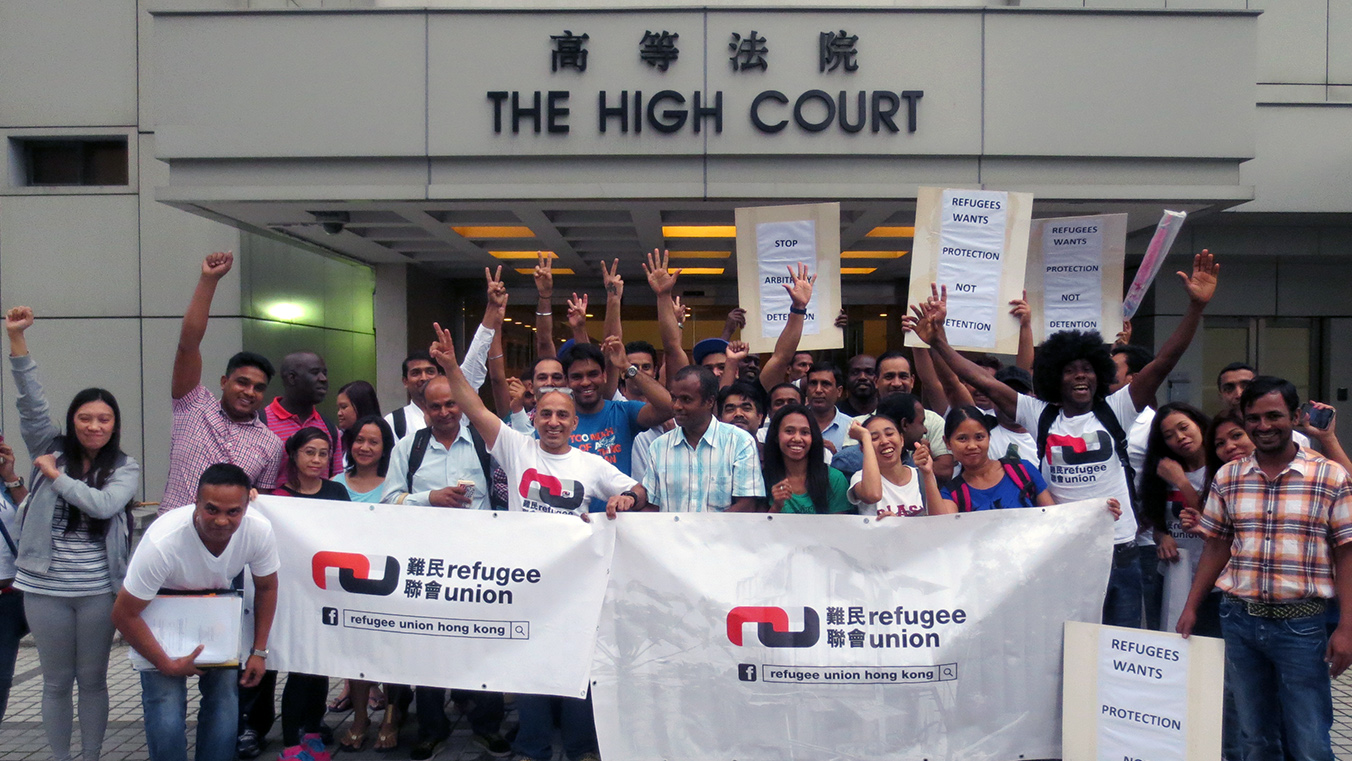
Blue notices on monthly ISS contracts
May 11th, 2015 | Refugee Community, Welfare | Comment
Vision First has learned from the refugee community that unusual ‘Blue Notices’ are being attached to the monthly ISS-HK agreements for provision of services. It is reported that the notices have appeared at all three ISS-HK branches in Prince Edward, Mongkok and Tsuen Wan.
The notices advise refugees to call, “ON MAY 28-29, 2015 TO KNOW WHERE YOU SHOULD REPORT FOR JUNE 2015 CONTRACT RENEWAL.” If it occurred only at one office, one could speculate that rental increase might be forcing a relocation. But why are these notices issued at three branches?
Upon inquiry from refugees, case workers replied that the office concerned was moving. Certainly relocation is hardly uncommon in ever expensive Hong Kong, but what are the odds of three branches ending leases with presumably three landlords at the same time?
It should be noted that June 2015 coincides with the Social Welfare Department starting its new contract for the provision of welfare services to asylum seekers and refugees. The SWD remains tight-lipped about upcoming changes according to the tendered issued in November 2014.
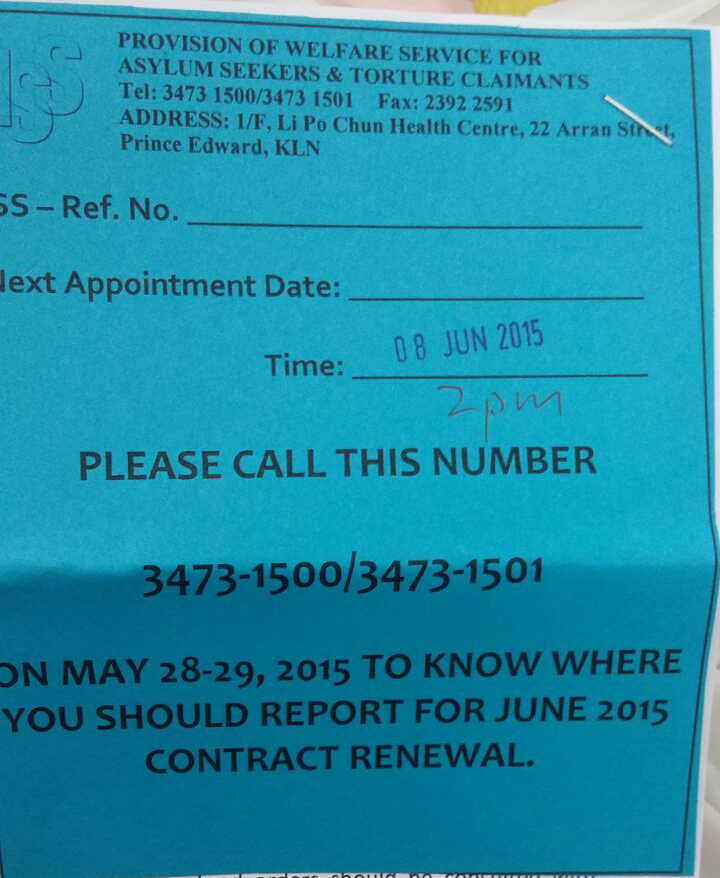
遠走異鄉的故事
May 11th, 2015 | Media, Personal Experiences, Refugee Community, Welfare | Comment
HKBU BJ HONOR PROJECT 2015 BY SANDY YEUNG
Hong Kong requires a legal board in Castle Peak Bay Immigration Centre
Apr 30th, 2015 | Detention, Immigration, Legal, Refugee Community | Comment
A year before the Unified Screening Mechanism was launched in March 2014, Vision First campaigned vigorously against Immigration Department’s apparently biased conduct and ostensible refusal to entertain CIDTP claims during the torture claim screening process. It is alarming that presently the problem is being repeated in relation to “Right to Life Claims.”
The rule of law in Hong Kong requires that every asylum claim be assessed with “anxious scrutiny and high standards of fairness” before Immigration exercises its statutory power of removal or deportation (CFA Prabakar case, Jun 2004) . This gives rise to an obligation to recognize the right not to be subject to torture, CIDTP and persecution for persons having no right to enter Hong Kong, including refugees detained in Castle Peak Bay Immigration Centre (CIC) – some who have never been released on recognizance.
Backed by reports from claimants detained for prolonged periods, Vision First is concerned by the secretive nature of detention at CIC. The availability of publicly funded lawyers and interpreters at interviews in CIC is not a guarantee of high standards of fairness when refugees are denied second opinions and there is no legal board to offer advice to those in need.
A Middle Eastern refugee was detained over 8 months and resisted several attempts at removal. He reports, “Immigration refused to believe me. They forced me to the airport but I resisted. I knew my rights and demanded to be released to prove my case. Others who didn’t speak English were not as lucky as me.”
A refugee from India had his case rejected as he languished for 10 months in CIC. He recalls, “My lawyer told me to drop my claim and leave Hong Kong. He refused to help me with the appeal. I thought he was serving the interests of Immigration.”
In April 2015, Vision First met with the Hong Kong Bar Association to raise concerns about the respect of fundamental refugee rights in CIC detention. Circumstantial evidence suggests that Immigration is arbitrarily denying applications for “Right to Life” protection in the centre. There is a widely held belief that the zero percent acceptance rate reflects a strategy to deny protection despite the potential risk of life and limb for those expelled from Hong Kong.
Detainees would be alarmed to know that between 2009 and 2014 Immigration rejected 99.54% of 5581 claims determined. It is doubtful that any one of the 25 substantiated claimants was recognized inside CIC and released with protected status. Immigration should report how many claimants from which countries are detained at the airport, screened in detention and removed without being released on recognizance. What assurances can be made that they were treated fairly?
Hong Kong urgently requires a legal board to independently advise claimants in Immigration detention and prisons, monitor the implementation of asylum practices and ensure that the Unified Screening Mechanism pays more than lip service to high standards of fairness. Until that day comes it is suspected that the screening system lacks credibility, not refugees.
A month has passed since Vision First wrote an open letter to Immigration raising a series of questions in connection with Right to Life claims. Disappointingly no substantive reply was received from the Director of Immigration. In early April the Refugee Union established a 24-hour helpline for CIC detainees who can only make two local phone calls a month. The union has been contacted by dozens of refugees who appealed for independent legal assistance with asylum claims and lamented the treatment they received away from the public eye.
